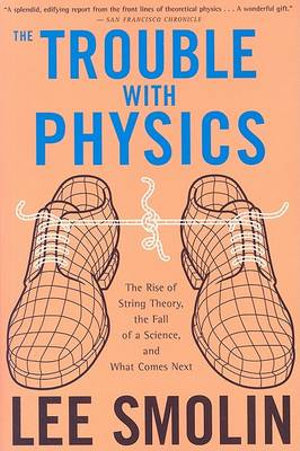I’m on my second attempt reading Lee Smolin’s 2006 book The Trouble With Physics. I am reminded of a similar situation with another book, Joyce’s Ulysses. And, similarly, my second attempt with The Trouble With Physics is not a reappraisal but a confirmation: this is hard to read.
 Smolin’s book is making a case for the fact that string theory is a failure; a spectacular failure that its adherents defend with a most byzantine theoretical web; that, because string theory is de rigueur in so many of the top schools, with so many reputations at stake, no one wants to recognize the fact that string theory — an attempt to harmonize the ideas of quantum theory and relativity so that we might understand the foundation of the universe more clearly — is a dead end.
Smolin’s book is making a case for the fact that string theory is a failure; a spectacular failure that its adherents defend with a most byzantine theoretical web; that, because string theory is de rigueur in so many of the top schools, with so many reputations at stake, no one wants to recognize the fact that string theory — an attempt to harmonize the ideas of quantum theory and relativity so that we might understand the foundation of the universe more clearly — is a dead end.
The problem I’m (still) having with the book is that Smolin is writing to an audience that is willing to take a steep (try 90 degrees upward) climb in order to understand the various concepts and theories which not only formed the foundation of string theory, but the issues that weren’t resolved through the original work of Newton, Einstein, etc. Smolin lays out in the beginning various fundamental aspects of how things work that we simply don’t know — instilling early that scientific inquiry is, if anything, about the need for curiosity. However, given Smolin’s densely described approach to get us ready to understand his arguments, and while I don’t doubt the necessity, I think he would need to double the length of his book to do so effectively for interested readers who are not physicists.
What is more successful, and the reason I continue to read it, is how Continue reading “The Trouble With The Trouble With Physics”


